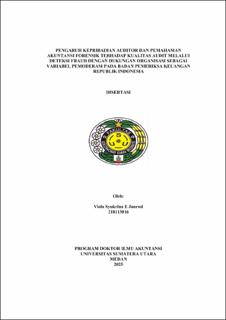Pengaruh Kepribadian Auditor dan Pemahaman Akuntansi Forensik terhadap Kualitas Audit melalui Deteksi Fraud dengan Dukungan Organisasi sebagai Variabel Pemoderasi pada Badan Pemeriksa Keuangan Republik Indonesia
The Influence of Auditor Personality and Forensic Accounting Understanding on Audit Quality through Fraud Detection with Organizational Support as a Moderating Variabel at Badan Pemeriksa Keuangan Republik Indonesia

Date
2025Author
Janrosl, Viola Syukrina E
Advisor(s)
Muda, Iskandar
Sadalia, Isfenti
Nasution, Abdillah Arif
Metadata
Show full item recordAbstract
This study examines the influence of auditor personality (extraversion, agreeableness, conscientiousness, neuroticism, and openness to experience) and understanding forensic accounting on audit quality through fraud detection, using organizational support as a moderating variable. The subject of this study is the 4.416 auditors that are part of the State Audit Board of the Republic of Indonesia, whether they are employees or a kantor perwakilan. This study's respondents include 200 auditors.
The study's findings indicate that auditor qualities (extraversion, agreeableness, conscientiousness, and openness to experience) and understanding of forensic akuntansi have a significant impact on audit quality. The qualities of an auditor (conscientiousness, openness to new experiences, and extraversion) and understanding forensic accounting have a significant impact on fraud detection. Openness to experience, diligence, and extraversion on the part of auditors have an impact on audit quality through fraud detection. Understanding forensic accounting has a significant impact on audit quality through fraud detection. Organizational support influences auditor qualities (agreeableness, conscientiousness, neuroticism, and openness to experience) in relation to audit quality. The organizational support has a significant impact on the understanding of forensic accounting with regard to audit quality.
This study successfully identifies the kind of auditor personality that need be present in an auditor in order to produce high-quality audits, including extraversion, agreeableness, conscientiousness, and openness to new experiences. This study also highlights the importance of auditor conscientiousness, openness to new experiences, and extraversion in detecting fraud. Organizational support influences auditor personality (agreeableness, conscientiousness, neuroticism, and openness to experience) in relation to audit quality.
